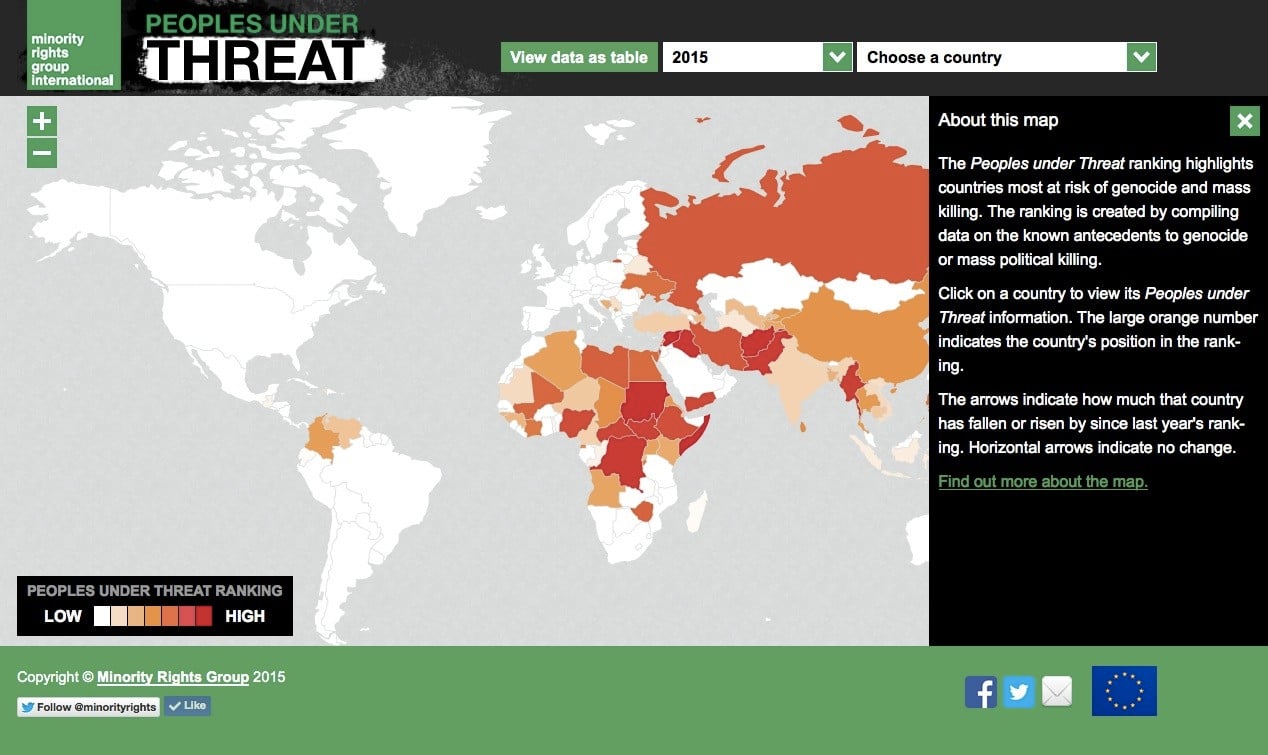
Peoples under Threat 2017: Killings in the no-access zone
Vulnerable peoples are living at deadly risk in a growing number of no-go zones around the world, says Minority Rights Group International (MRG) in the 2017 Peoples under Threat index and online map.
This year’s index, which seeks to identify those countries around the world that are most at risk of genocide, mass killing or systematic violent repression, highlights how lack of access from the outside world allows killing to be perpetrated unchecked in disputed territories, militarized enclaves and, in some cases, whole countries.
‘More and more governments are refusing access to international monitors, claiming that it is an interference in their in their internal affairs or even that they cannot guarantee monitors’ safety. What exactly are they trying to hide?’ says Mark Lattimer, MRG’s Executive Director.
In June 2017 the United Nations High Commissioner for Human Rights reiterated his alarm at the refusal of several states to grant access to his staff.
Many of the states criticized for impeding international scrutiny in recent months feature on the list of major risers in the Peoples under Threat index this year, including Nigeria, Burundi, Eritrea and Turkey. Many others sit at or near the top of the index, such as Syria, Iran and Israeli-occupied Palestinian territory and Myanmar, or were major risers last year, including Ukraine (Crimea), Egypt, North Korea and Venezuela.
‘International isolation is a known risk factor for genocide or mass killing. If governments are increasingly evading international scrutiny, this is a serious concern,’ adds Lattimer.
Where official monitors and investigators cannot enter, local civilian activists have nonetheless raised the alarm about arbitrary detentions, torture and mass killing. In one situation after another, violations are targeted at communities on ethnic, religious or sectarian grounds, says MRG.
Two-thirds of the country situations in the list of major risers are in Africa.
Nigeria has failed to respond to at least 14 outstanding requests to visit from the UN. The government has claimed extensive military successes in the war against Boko Haram rebels, but both the Nigerian army and the extensive cadres of local vigilante groups supported by the government have been responsible for widespread abuses.
In Burundi, President Nkurunziza’s bid for an unconstitutional third term of office sparked widespread protests from 2015 and hundreds of people were killed in a violent clampdown. The UN commission of inquiry has been denied entry, as have officials from the African Union. Nkurunziza signed a decree announcing Burundi’s intention to withdraw from the International Criminal Court.
Since its independence from neighbouring Ethiopia 25 years ago, Eritrea has yet to hold national elections or have a free media presence. In 2016 a UN commission – barred from entering the country – concluded that during that time officials in Eritrea have committed crimes against humanity, including enslavement, rape and torture.
A failed coup in Turkey in July 2016 was followed by a nationwide programme of dismissal and arrest of tens of thousands of public officials, including judges, teachers, journalists and NGO staff. Amidst military operations in south-east Turkey targeted at the Kurdistan Workers’ Party, alleged violations against Kurds include extrajudicial executions, demolitions of civilian homes, and mass displacement. A request from the UN for ‘effective and unfettered access’ continues to be denied.
Syria heads the Peoples under Threat index again in 2017. UN human rights officials have been granted no access to Syria since the crisis began in 2011. In that time, some 400,000 people have been killed, more than six million are internally displaced and over five million have fled the country to seek refuge abroad.
In Burma/Myanmar, violations of human rights in Rakhine state have been ‘horrifying in the extreme’ according to OHCHR, but the government has refused to provide full and unmonitored access. The violations have been mainly targeted at the Rohingya, and include allegations of gang rape and child killings by security forces.
This is the 12th year that the Peoples under Threat index has been released by MRG. Based on current indicators from authoritative sources, the index provides early warning of potential future mass atrocities.
Notes to editors
- Interview opportunities:
Mark Lattimer, MRG Executive Director (London, UK).
Minority representatives from countries featured in the index.
- Visit MRG’s online map which visualizes data from the Peoples under Threat. View the map by year or by country, and find links to reports, press releases and further information on the communities under threat.
- Download the full Peoples under Threat global ranking and accompanying notes.
- Minority Rights Group International is the leading international human rights organization working to secure the rights of ethnic, religious and linguistic minorities and indigenous peoples. We work with more than 150 partners in over 50 countries.
For more information, to receive an embargoed copy of the Peoples under Threat index, or to arrange interviews please contact:
Emma Eastwood – MRG Press Office (London, UK)
T: +44 (0)207 4224205
M: +44 (0)7989699984
E: [email protected]
Twitter:@MinorityRights #PUT_17